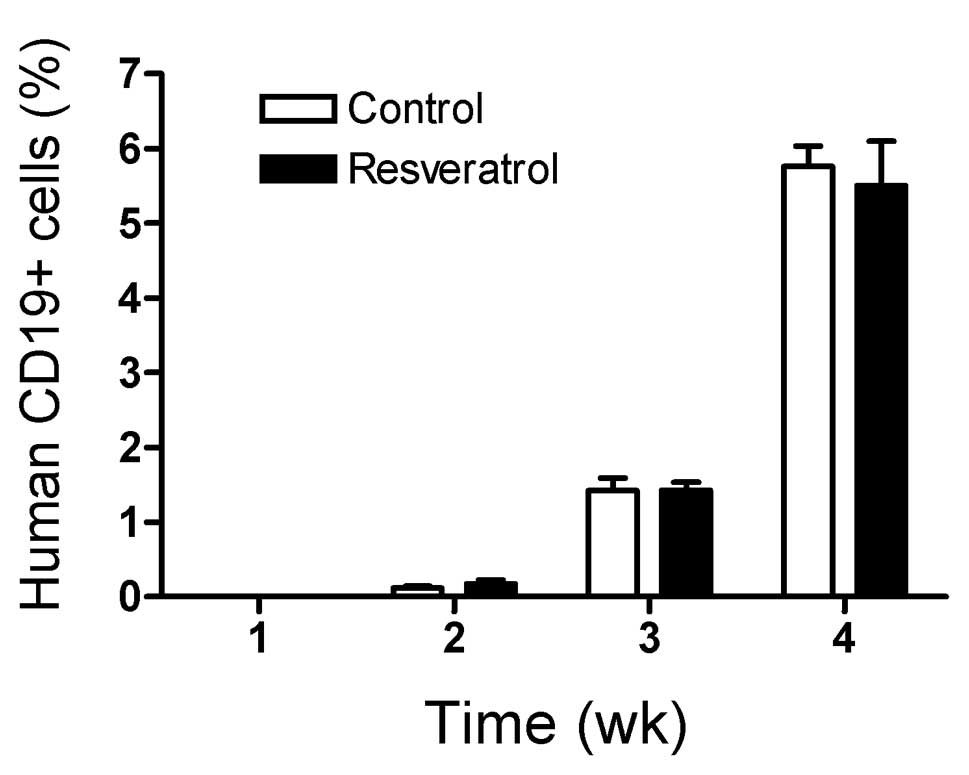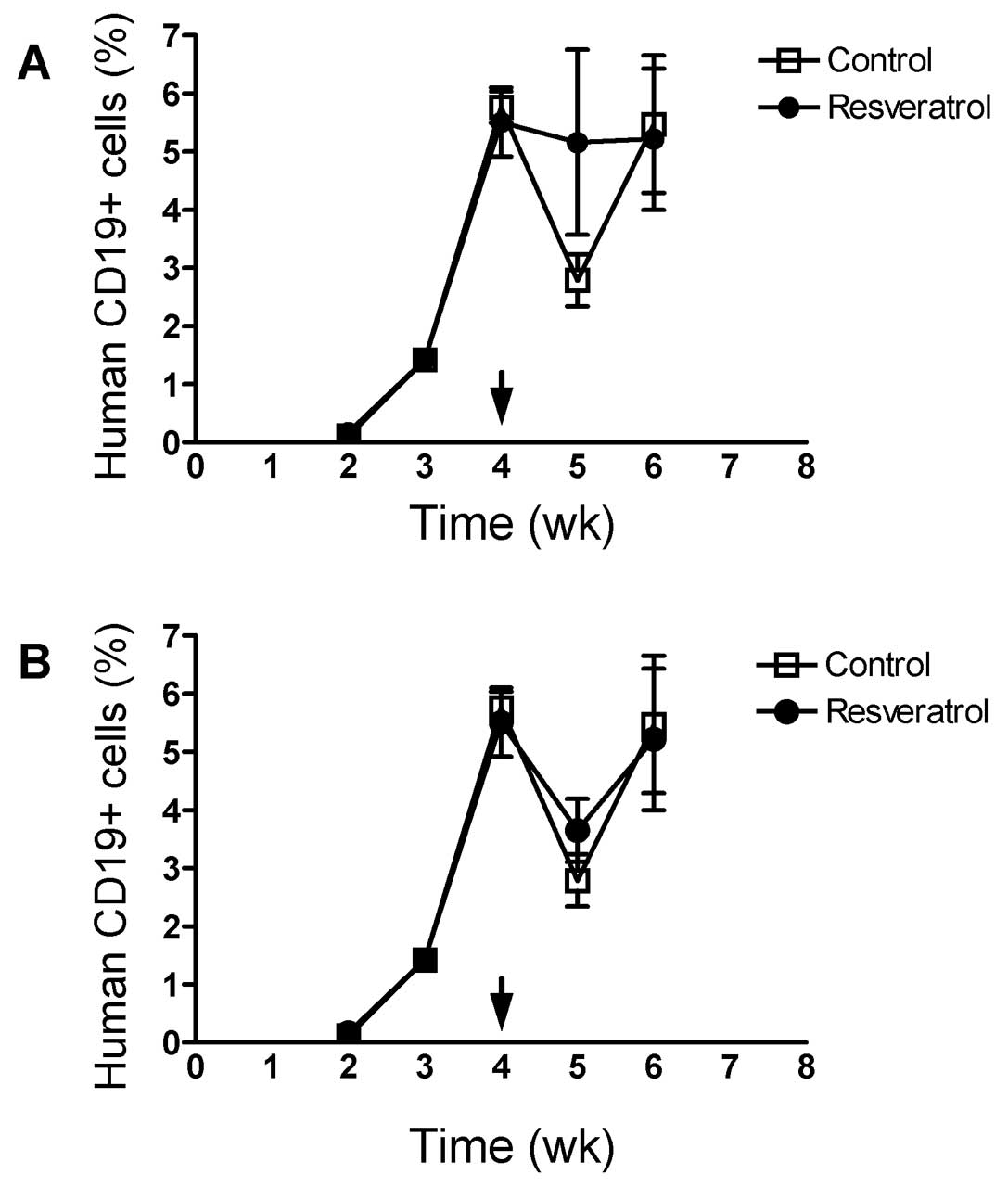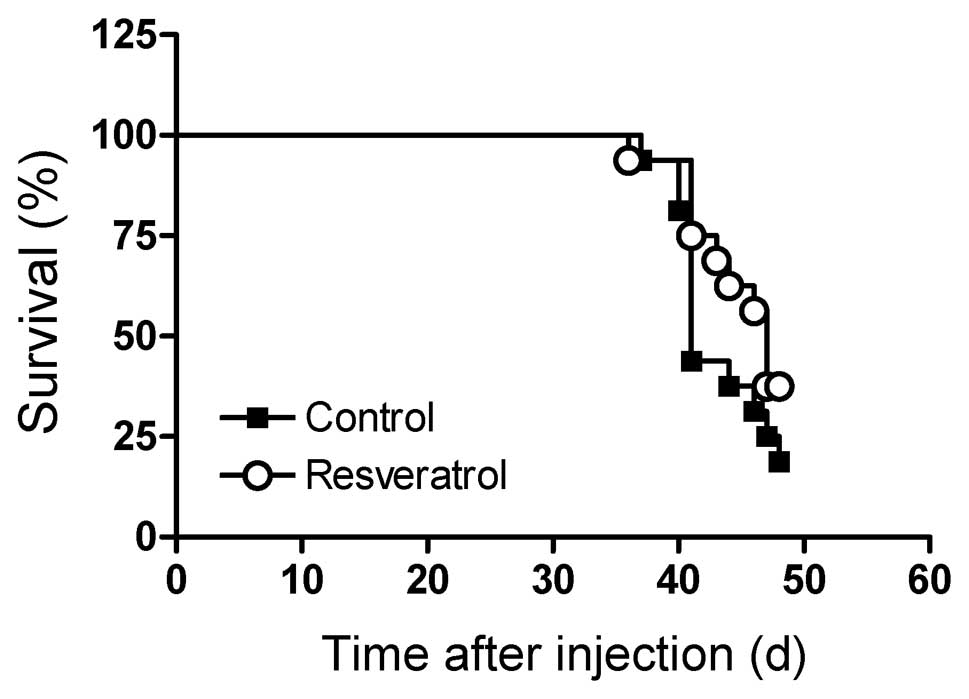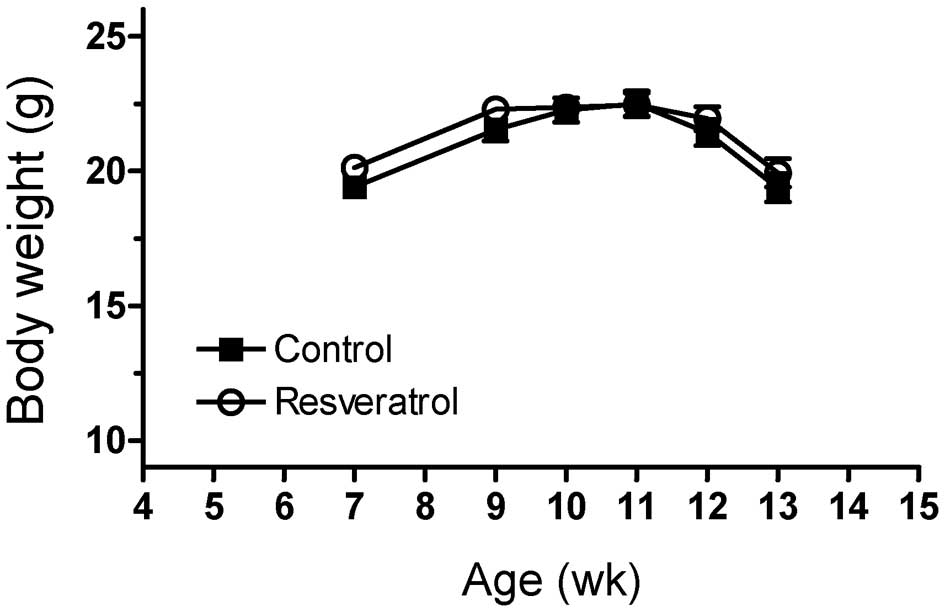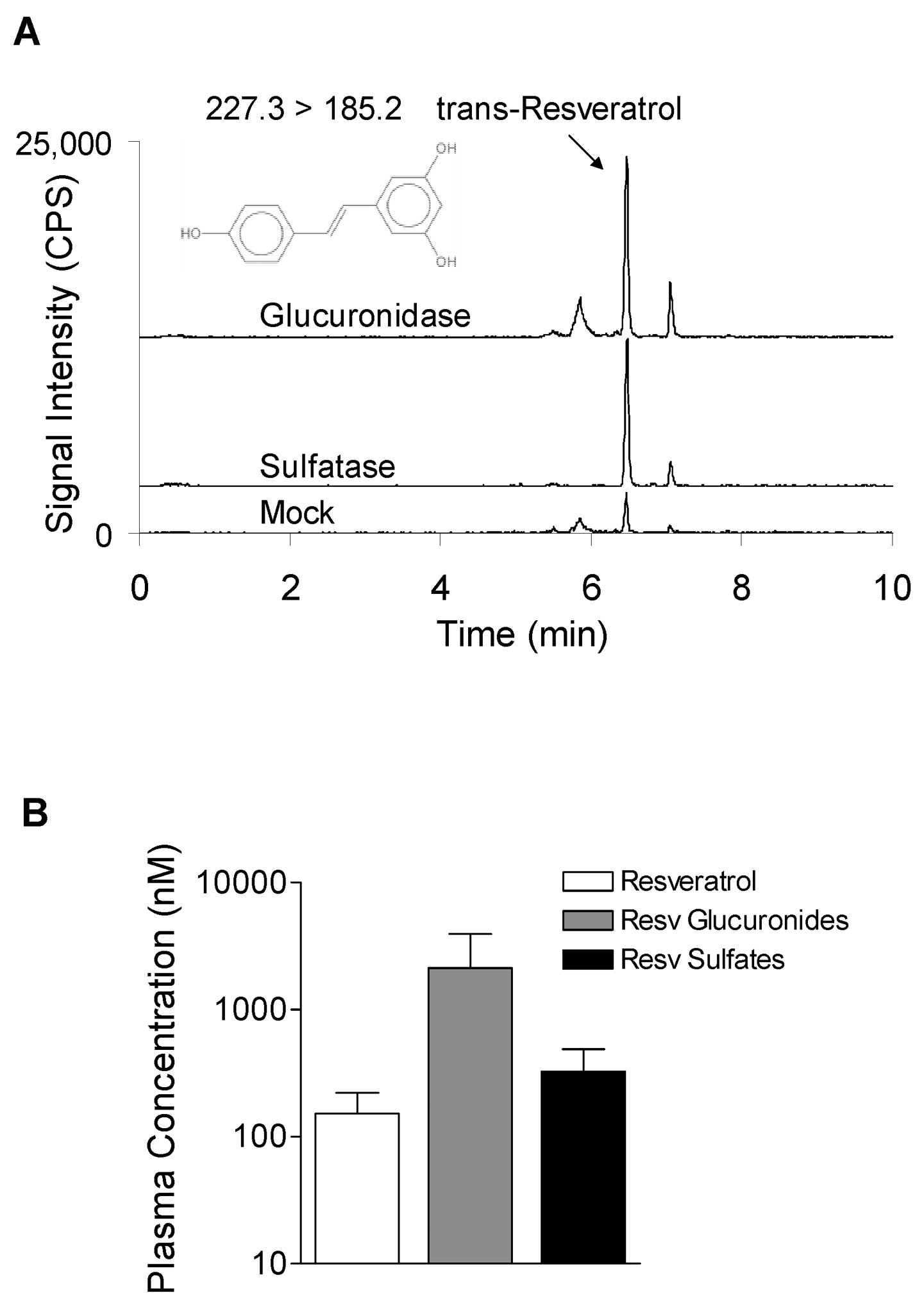|
1.
|
BB AggarwalA BhardwajRS AggarwalNP SeeramS
ShishodiaRole of resveratrol in prevention and therapy of cancer:
preclinical and clinical studiesAnticancer
Res2427832840200415517885
|
|
2.
|
S BanerjeeC Bueso-RamosBB
AggarwalSuppression of 7,12-dimethylbenz(a)anthracene-induced
mammary carcinogenesis in rats by resveratrol: role of nuclear
factor-κB, cyclo-oxygenase 2, and matrix metalloproteinase 9Cancer
Res6249454954200212208745
|
|
3.
|
ZG LiT HongY ShimadaI KomotoA
KawabeSuppression of N-nitrosomethylbenzylamine (NMBA)-induced
esophageal tumorigenesis in F344 rats by
resveratrolCarcinogenesis2315311536200210.1093/carcin/23.9.153112189197
|
|
4.
|
EO LeeHJ LeeHS HwangKS AhnC ChaePotent
inhibition of Lewis lung cancer growth by heyneanol A from the
roots of Vitis amurensis through apoptotic and anti-angiogenic
activitiesCarcinogenesis2720592069200610.1093/carcin/bgl05516675471
|
|
5.
|
HS LiuCE PanW YangXM LiuAntitumor and
immunomodulatory activity of resveratrol on experimentally
implanted tumor of H22 in Balb/c miceWorld J
Gastroenterol914741476200312854144
|
|
6.
|
L TessitoreA DavitI SarottoG
CaderniResveratrol depresses the growth of colorectal aberrant
crypt foci by affecting bax and p21(CIP)
expressionCarcinogenesis2116191622200010.1093/carcin/21.8.161910910967
|
|
7.
|
SC GuptaR KannappanS ReuterJH KimBB
AggarwalChemosensitization of tumors by resveratrolAnn NY Acad
Sci1215150160201110.1111/j.1749-6632.2010.05852.x21261654
|
|
8.
|
D ColinE LimagneS JeanningrosA JacquelG
LizardEndocytosis of resveratrol via lipid rafts and activation of
downstream signaling pathways in cancer cellsCancer Prev
Res410951106201110.1158/1940-6207.CAPR-10-027421467134
|
|
9.
|
G LiS HeL ChangH LuH ZhangGADD45α and
annexin A1 are involved in the apoptosis of HL-60 induced by
resveratrolPhytomedicine187047092011
|
|
10.
|
M KartalG SaydamF SahinY BaranResveratrol
triggers apoptosis through ceramide metabolizing genes in human
K562 chronic myeloid leukemia cellsNutr
Cancer63637644201110.1080/01635581.2011.53848521500096
|
|
11.
|
S FaderlHM KantarjianM TalpazZ
EstrovClinical significance of cytogenetic abnormalities in adult
acute lymphoblastic leukemiaBlood913995401919989596644
|
|
12.
|
MF GreavesJ WiemelsOrigins of chromosome
translocations in childhood leukaemiaNat
Rev3111200310.1038/nrc1164
|
|
13.
|
J GreilM GramatzkiR BurgerR MarschalekM
PeltnerThe acute lymphoblastic leukaemia cell line SEM with t(4;11)
chromosomal rearrangement is biphenotypic and responsive to
interleukin-7Br J
Haematol86275283199410.1111/j.1365-2141.1994.tb04726.x8199015
|
|
14.
|
RC StongSJ KorsmeyerJL ParkinDC ArthurJH
KerseyHuman acute leukemia cell line with the t(4;11) chromosomal
rearrangement exhibits B lineage and monocytic
characteristicsBlood65213119853917311
|
|
15.
|
B LangeM ValtieriD SantoliD CaraccioloF
MavilioGrowth factor requirements of childhood acute leukemia:
establishment of GM-CSF-dependent cell
linesBlood7019219919873496132
|
|
16.
|
G BaerschT MollersA HotteB
Dockhorn-DworniczakC RubeGood engraftment of B-cell precursor ALL
in NOD-SCID miceKlin
Padiatr209178185199710.1055/s-2008-10439479293448
|
|
17.
|
A BorgmannC BaldyA von StackelbergB
BeyermannI FichtnerChildhood ALL blasts retain phenotypic and
genotypic characteristics upon long-term serial passage in NOD/SCID
micePediatr Hematol
Oncol17635650200010.1080/0888001005021134911127395
|
|
18.
|
NLM LiemRA PapaCG MilrossMA SchmidM
TajbakhshCharacterization of childhood acute lymphoblastic leukemia
xenograft models for the preclinical evaluation of new
therapiesBlood10339053914200410.1182/blood-2003-08-291114764536
|
|
19.
|
RB LockN LiemML FarnsworthCG MilrossC
XueThe nonobese diabetic/severe combined immunodeficient (NOD/SCID)
mouse model of childhood acute lymphoblastic leukemia reveals
intrinsic differences in biologic characteristics at diagnosis and
relapseBlood9941004108200210.1182/blood.V99.11.4100
|
|
20.
|
BA NijmeijerP MollevangerSL van
Zelderen-BholaHC Kluin-NelemansR WillemzeMonitoring of engraftment
and progression of acute lymphoblastic leukemia in individual
NOD/SCID miceExp
Hematol29322329200110.1016/S0301-472X(00)00669-X11274760
|
|
21.
|
J DörrieH GerauerY WachterSJ
ZuninoResveratrol induces extensive apoptosis by depolarizing
mitochondrial membranes and activating caspase-9 in acute
lymphoblastic leukemia cellsCancer Res6147314739200111406544
|
|
22.
|
J DörrieK SapalaSJ ZuninoCarnosol-induced
apoptosis and downregulation of Bcl-2 in B-lineage leukemia
cellsCancer Lett1703339200111448532
|
|
23.
|
C KellnerSJ ZuninoNitric oxide is
synthesized in acute leukemia cells after exposure to phenolic
antioxidants and initially protects against mitochondrial membrane
depolarizationCancer
Lett2154352200410.1016/j.canlet.2004.06.046
|
|
24.
|
JB NachmanHN SatherMG SenselME TriggJM
CherlowAugmented post-induction therapy for children with high-risk
acute lymphoblastic leukemia and a slow response to initial
therapyN Engl J
Med33816631671199810.1056/NEJM1998060433823049614257
|
|
25.
|
JA CrowellPJ KorytkoRL MorrisseyTD BoothBS
LevineResveratrol-associated renal toxicityToxicol
Sci82614619200410.1093/toxsci/kfh26315329443
|
|
26.
|
SJ ZuninoDH StormsJM DucoreNovel in vivo
model of inducible multi-drug resistance in acute lymphoblastic
leukemia with chromosomal translocation t(4;11)Cancer
Lett2964954201010.1016/j.canlet.2010.03.01720381955
|
|
27.
|
SJ ZuninoDH StormsJW NewmanTL PedersenCL
KeenJM DucoreResveratrol given intraperitoneally does not inhibit
the growth of high-risk t(4;11) acute lymphoblastic leukemia cells
in a NOD/SCID mouse modelInt J Oncol4012771284201222200740
|
|
28.
|
VA BrownKR PatelM ViskadurakiJA CrowellM
PerloffRepeat dose study of the cancer chemopreventive agent
resveratrol in healthy volunteers: safety, pharmacokinetics, and
effect on the insulin-like growth factor axisCancer
Res7090039011201010.1158/0008-5472.CAN-10-236420935227
|
|
29.
|
KR PatelE ScottVA BrownAJ GescherWP
StewardClinical trials of resveratrolAnn NY Acad
Sci1215161169201110.1111/j.1749-6632.2010.05853.x21261655
|
|
30.
|
T WalleF HsiehMH De LeggeJE OatisUK
WalleHigh absorption but very low bioavailability of oral
resveratrol in humansDrug Metab
Dispos3213771382200410.1124/dmd.104.00088515333514
|
|
31.
|
X VitracA DesmouliereB BrouillaudS KrisaG
DeffieuxDistribution of [14C]-trans-resveratrol, a cancer
chemopreventive polyphenol, in mouse tissues after oral
administrationLife Sci72221922332003
|
|
32.
|
E WenzelT SoldoH ErbersdoblerV
SomozaBioactivity and metabolism of trans-resveratrol orally
administered to Wistar ratsMol Nutr Food
Res49482494200510.1002/mnfr.20050000315779067
|
|
33.
|
JA BaurDA SinclairTherapeutic potential of
resveratrol: the in vivo evidenceNat Rev Drug
Discov5493506200610.1038/nrd206016732220
|
|
34.
|
Y KimuraH OkudaResveratrol isolated from
Polygonum cuspidatum root prevents tumor growth and metastasis to
lung and tumor-induced neovascularization in Lewis lung
carcinoma-bearing miceJ Nutr13118441849200111385077
|
|
35.
|
S BusquetsE AmetllerG FusterM OlivanV
RaabResveratrol, a natural diphenol, reduces metastatic growth in
an experimental cancer modelCancer
Lett245144148200710.1016/j.canlet.2005.12.03516466851
|
|
36.
|
YL WengHF LiaoAF LiJC ChangRY ChiouOral
administration of resveratrol in suppression of pulmonary
metastasis of BALB/c mice challenged with CT26 colorectal
adenocarcinoma cellsMol Nutr Food
Res54259267201010.1002/mnfr.20090004919862773
|
|
37.
|
SH KweonJH SongTS KimResveratrol-mediated
reversal of doxorubicin resistance in acute myeloid leukemia cells
via down-regulation of MRP1 expressionBiochem Biophys Res
Commun395104110201010.1016/j.bbrc.2010.03.14720350534
|
|
38.
|
KB HarikumarAB Kunnumakkara1G SethiP
DiagaradjaneP AnandResveratrol, a multitargeted agent, can enhance
antitumor activity of gemcitabine in vitro and in orthotopic mouse
model of human pancreatic cancerInt J
Cancer127257268201019908231
|















